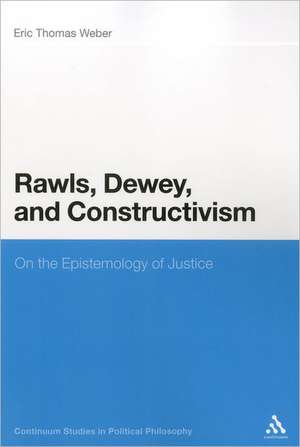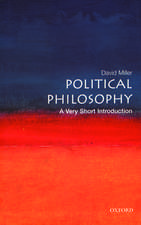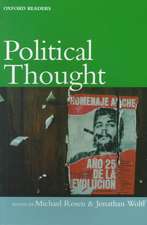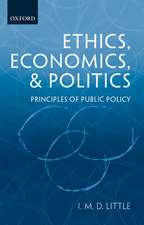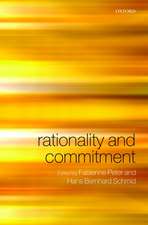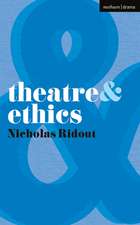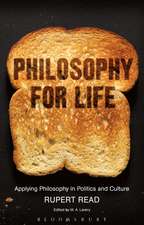Rawls, Dewey, and Constructivism: On the Epistemology of Justice: Continuum Studies in Political Philosophy
Autor Professor Eric Thomas Weberen Limba Engleză Paperback – 22 feb 2012
| Toate formatele și edițiile | Preț | Express |
|---|---|---|
| Paperback (1) | 255.29 lei 6-8 săpt. | |
| Bloomsbury Publishing – 22 feb 2012 | 255.29 lei 6-8 săpt. | |
| Hardback (1) | 888.97 lei 6-8 săpt. | |
| Bloomsbury Publishing – 21 iul 2010 | 888.97 lei 6-8 săpt. |
Preț: 255.29 lei
Preț vechi: 330.04 lei
-23% Nou
Puncte Express: 383
Preț estimativ în valută:
48.85€ • 52.24$ • 40.73£
48.85€ • 52.24$ • 40.73£
Carte tipărită la comandă
Livrare economică 17 aprilie-01 mai
Preluare comenzi: 021 569.72.76
Specificații
ISBN-13: 9781441199447
ISBN-10: 1441199446
Pagini: 176
Dimensiuni: 156 x 234 x 10 mm
Greutate: 0.25 kg
Editura: Bloomsbury Publishing
Colecția Continuum
Seria Continuum Studies in Political Philosophy
Locul publicării:London, United Kingdom
ISBN-10: 1441199446
Pagini: 176
Dimensiuni: 156 x 234 x 10 mm
Greutate: 0.25 kg
Editura: Bloomsbury Publishing
Colecția Continuum
Seria Continuum Studies in Political Philosophy
Locul publicării:London, United Kingdom
Caracteristici
Explores the implications of a fully constructivist idea of justice for practical theories of education.
Notă biografică
Eric Thomas Weber is Assistant Professor of Public Policy Leadership at the University of Mississippi, USA. He has published in Human Studies, Review of Policy Research, Skepsis, William James Studies, Contemporary Pragmatism, and Transactions of the Charles S. Peirce Society. He is the author of Rawls, Dewey, and Constructivism (Continuum, 2010).
Cuprins
1. Introduction \ 2. Social Contract Theory, Old and New \ 3. Worlds Apart: On Moral Realism and Two Constructivisms \ 4. Freedom and Phenomenal Persons \ 5. Rawls's Epistemological Tension: The Original Position, Reflective Equilibrium, and Objectivity \ 6. Dewey and Rawls on Education \ Bibliography \ Index
Recenzii
... Weber's critique is respectful rather than polemical, remaining robust but also judicious and collegial throughout... What distinguishes this work is its comprehensive identification of Kant as the primary source of epistemological ambiguity in Rawls and the subsequent force of Weber's rich illustration of the merits of Deweyan philosophy in plugging these deficiencies and more.
"Eric Weber provides a well considered and carefully crafted analysis of the work of John Rawls from a Pragmatist perspective. Chapter six alone, 'Dewey and Rawls on Education,' is worth the price of admission." - Larry A. Hickman, Center for Dewey Studies, Southern Illinois University, USA
"Eric Thomas Weber's comparative study identifies a deep Kantian tension between constructivism and representationalism in Rawls. His well informed, very clear and persuasive critique of Rawls highlights the many resources of Dewey's constructivism and constructivist epistemology for democratic political philosophy." - Tom Rockmore, Duquesne University, USA
Eric Thomas Weber's excellent book raises a constructivist challenge against Rawls's constructivism... In his short, tightly-argued book, Weber further develops the constructivist criticism of Rawls in creatively comparing and contrasting the views of Rawls and Dewey.
'Weber's Rawls, Dewey and Constructivism provides a welcome addition tothe Rawls literature by offering a Deweyan critique of,and alternative to, Rawlsian constructivism....In the contemporary political and economic climate, Weber's call for strengthening the American tradition of public, humanistic education is refreshing.'
"Eric Thomas Weber's excellent book raises a constructivist challenge against Rawls's constructivism...Weber's Deweyan critique of Rawls's constructivist conception of justice points to the difficulty in grasping Kantian constructivism. In Rawls's writings, the reference to Kantian constructivism is so vague as to be essentially meaningless. That is one of the implications of this very useful book." - Notre Dame Philosophical Reviews
Weber's first book covers more territory than its title suggests, and provides concise, relevant, and accurate summaries of a host of philosophers from Kant's contemporaries to ours. The relevance of Dewey's philosophy of education to political philosophy and its ability to resolve the tensions within the dominant philosophy of Rawls, suggests that there is a need for this book...Weber's assessment of Rawls's constructivism will help readers determine if Deweyan pragmatists should in fact be Rawlsians, as Talisse provocatively suggested, or if, as Weber would have it, Rawlsians should turn to Dewey.
"Eric Weber provides a well considered and carefully crafted analysis of the work of John Rawls from a Pragmatist perspective. Chapter six alone, 'Dewey and Rawls on Education,' is worth the price of admission." - Larry A. Hickman, Center for Dewey Studies, Southern Illinois University, USA
"Eric Thomas Weber's comparative study identifies a deep Kantian tension between constructivism and representationalism in Rawls. His well informed, very clear and persuasive critique of Rawls highlights the many resources of Dewey's constructivism and constructivist epistemology for democratic political philosophy." - Tom Rockmore, Duquesne University, USA
Eric Thomas Weber's excellent book raises a constructivist challenge against Rawls's constructivism... In his short, tightly-argued book, Weber further develops the constructivist criticism of Rawls in creatively comparing and contrasting the views of Rawls and Dewey.
'Weber's Rawls, Dewey and Constructivism provides a welcome addition tothe Rawls literature by offering a Deweyan critique of,and alternative to, Rawlsian constructivism....In the contemporary political and economic climate, Weber's call for strengthening the American tradition of public, humanistic education is refreshing.'
"Eric Thomas Weber's excellent book raises a constructivist challenge against Rawls's constructivism...Weber's Deweyan critique of Rawls's constructivist conception of justice points to the difficulty in grasping Kantian constructivism. In Rawls's writings, the reference to Kantian constructivism is so vague as to be essentially meaningless. That is one of the implications of this very useful book." - Notre Dame Philosophical Reviews
Weber's first book covers more territory than its title suggests, and provides concise, relevant, and accurate summaries of a host of philosophers from Kant's contemporaries to ours. The relevance of Dewey's philosophy of education to political philosophy and its ability to resolve the tensions within the dominant philosophy of Rawls, suggests that there is a need for this book...Weber's assessment of Rawls's constructivism will help readers determine if Deweyan pragmatists should in fact be Rawlsians, as Talisse provocatively suggested, or if, as Weber would have it, Rawlsians should turn to Dewey.
Descriere
Descriere de la o altă ediție sau format:
Examines and critiques John Rawls' epistemology and the unresolved tension - inherited from Kant - between Representationalism and Constructivism in Rawls' work. This title argues that, despite Rawls' claims to be a constructivist, his unexplored Kantian influences cause several problems.
Examines and critiques John Rawls' epistemology and the unresolved tension - inherited from Kant - between Representationalism and Constructivism in Rawls' work. This title argues that, despite Rawls' claims to be a constructivist, his unexplored Kantian influences cause several problems.
